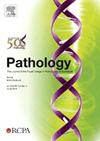再生福尔马林:一种新的工具,以减轻外科病理在常规实践中的环境影响。
IF 3
3区 医学
Q1 PATHOLOGY
引用次数: 0
摘要
福尔马林被普遍认为是组织固定的金标准。然而,它是一种危险的有毒化学物质,没有任何现实的替代品。因此,减少其使用似乎是减少其对环境影响的唯一途径。我们评估了一种创新的福尔马林回收回路的可行性,该回路基于活检去除和纸过滤后福尔马林的再利用。我们还评估了在不影响工作质量和安全的情况下,在日常实践中减少福尔马林使用政策的效率。回收的福尔马林在化学和分子性质以及组织样品的固定、分析和储存方面与新福尔马林相当。此外,它用于固定并不影响分子分析。我们计算出,与2021年相比,我们的工艺将使2022年的福尔马林总消耗量减少26%。这相当于节省了4620欧元的资金,减少了2434公斤二氧化碳当量的温室气体,并大大降低了对人类和淡水的毒性。我们的回收福尔马林电路是一种简单,易于实施,有效的方法,可以减轻福尔马林在外科病理中的环境影响,而不会影响分析质量和病理人员的安全。本文章由计算机程序翻译,如有差异,请以英文原文为准。
Recycled formalin: a new tool to mitigate the environmental impact of surgical pathology in routine practice
Formalin is universally acknowledged as the gold standard for tissue fixation. However, it is a dangerous toxic chemical without any realistic substitute. Therefore, decreasing its use seems to be the only way to reduce its environmental impact. We assessed the feasibility of an innovative formalin recycling circuit based on the reuse of formalin following biopsy removal and paper filtration. We also assessed the efficiency of a policy of less formalin use in routine practice without compromising work quality and security. The recycled formalin was equivalent to new formalin in terms of its chemical and molecular properties, as well as the fixation, analysis, and storage of tissue samples. Moreover, its use for fixation did not affect molecular analyses. We calculate that our process would have decreased the total consumption of formalin in 2022 by 26% compared to 2021. This corresponds to financial savings of €4620, a 2434 kg CO2 equivalent reduction in greenhouse gases, and substantial decreases in toxicity to humans and freshwater. Our recycled formalin circuit is a simple, easy-to-implement, efficient way to mitigate the environmental impact of formalin in surgical pathology without compromising the quality of analysis and the safety of the pathology staff.
求助全文
通过发布文献求助,成功后即可免费获取论文全文。
去求助
来源期刊

Pathology
医学-病理学
CiteScore
6.50
自引率
2.20%
发文量
459
审稿时长
54 days
期刊介绍:
Published by Elsevier from 2016
Pathology is the official journal of the Royal College of Pathologists of Australasia (RCPA). It is committed to publishing peer-reviewed, original articles related to the science of pathology in its broadest sense, including anatomical pathology, chemical pathology and biochemistry, cytopathology, experimental pathology, forensic pathology and morbid anatomy, genetics, haematology, immunology and immunopathology, microbiology and molecular pathology.
 求助内容:
求助内容: 应助结果提醒方式:
应助结果提醒方式:


